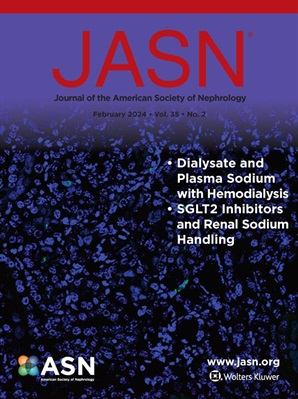异体肾移植排斥反应的无创诊断。
IF 9.4
1区 医学
Q1 UROLOGY & NEPHROLOGY
引用次数: 0
摘要
尽管对肾移植受者进行常规监测,但同种异体移植排斥反应仍然是肾移植长期成功的障碍,也是移植失败的主要原因之一。肾移植排斥反应和移植物衰竭是患者最担心的结果。排斥反应的及时诊断和早期治疗使干预能够在不可逆的移植物损伤发生之前减弱同种免疫过程。无创诊断工具的发展前景为早期发现同种异体肾移植排斥反应提供了有希望的机会。这些工具单独使用或组合使用,可及时发出活检需要的信号,减少监测活检的需要,甚至可能为治疗监测提供信息。因此,它们是至关重要的,它们的使用应以证据为依据,指导患者及其临床团队。本综述将涵盖用于诊断同种异体肾移植排斥反应的无创检测,并描述其诊断背景、优势和局限性,同时为其应用提出一个理想的临床框架。本文章由计算机程序翻译,如有差异,请以英文原文为准。
Noninvasive Diagnosis of Kidney Allograft Rejection.
Despite regular conventional monitoring of kidney transplant recipients, allograft rejection remains a barrier for the long-term success of kidney transplantation and is one of the leading causes of graft failure. Kidney transplant rejection and graft failure are reported as the most feared outcomes by patients. Timely diagnosis of rejection and early treatment enable interventions which may attenuate alloimmune processes before irreversible graft injury has occurred. The evolving landscape of noninvasive diagnostic tools presents promising opportunities for early detection of kidney allograft rejection. These tools, alone or combined, may promptly signal the need for a biopsy, reduce the need for surveillance biopsies, or even potentially inform treatment monitoring. Therefore, they are of utmost importance, and their use should be informed by evidence, guiding both patients and their clinical teams. This review will cover noninvasive tests used for the diagnosis of kidney allograft rejection available or soon to be available in the clinical setting, and describe their diagnostic context, strengths and limitations, while proposing an ideal clinical framework for their use.
求助全文
通过发布文献求助,成功后即可免费获取论文全文。
去求助
来源期刊
CiteScore
22.40
自引率
2.90%
发文量
492
审稿时长
3-8 weeks
期刊介绍:
The Journal of the American Society of Nephrology (JASN) stands as the preeminent kidney journal globally, offering an exceptional synthesis of cutting-edge basic research, clinical epidemiology, meta-analysis, and relevant editorial content. Representing a comprehensive resource, JASN encompasses clinical research, editorials distilling key findings, perspectives, and timely reviews.
Editorials are skillfully crafted to elucidate the essential insights of the parent article, while JASN actively encourages the submission of Letters to the Editor discussing recently published articles. The reviews featured in JASN are consistently erudite and comprehensive, providing thorough coverage of respective fields. Since its inception in July 1990, JASN has been a monthly publication.
JASN publishes original research reports and editorial content across a spectrum of basic and clinical science relevant to the broad discipline of nephrology. Topics covered include renal cell biology, developmental biology of the kidney, genetics of kidney disease, cell and transport physiology, hemodynamics and vascular regulation, mechanisms of blood pressure regulation, renal immunology, kidney pathology, pathophysiology of kidney diseases, nephrolithiasis, clinical nephrology (including dialysis and transplantation), and hypertension. Furthermore, articles addressing healthcare policy and care delivery issues relevant to nephrology are warmly welcomed.

 求助内容:
求助内容: 应助结果提醒方式:
应助结果提醒方式:


